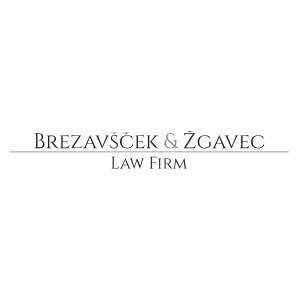Best Banking & Finance Lawyers in Slovenia
Share your needs with us, get contacted by law firms.
Free. Takes 2 min.
Or refine your search by selecting a city:
List of the best lawyers in Slovenia
About Banking & Finance Law in Slovenia
Banking and finance law in Slovenia is a sophisticated framework that regulates the functioning of financial institutions, the issuance of financial products, and the protection of consumer rights in relation to financial transactions. The system is aligned with European Union regulations and is designed to ensure stability, transparency, and integrity in the financial market. Key entities such as the Bank of Slovenia play a pivotal role in overseeing monetary policy and financial supervision.
Why You May Need a Lawyer
Individuals and businesses might require legal assistance in banking and finance for various reasons. Common scenarios include disputes over loans or mortgages, ambiguous terms in financial contracts, regulatory compliance issues, and cases of financial fraud. Legal advice is also crucial for businesses seeking to ensure that their financial operations adhere to local and EU laws, or when navigating mergers and acquisitions.
Local Laws Overview
Slovenia's banking and finance laws are primarily influenced by the EU's regulatory framework. Key legislations include the Banking Act, the Consumer Credit Act, and regulations enforced by the Bank of Slovenia. These laws cover areas such as licensing requirements for financial institutions, consumer protection in financial transactions, and measures against money laundering. Slovenia also has specific regulations governing electronic payment systems and digital banking services.
Frequently Asked Questions
What are the main regulatory bodies overseeing banking in Slovenia?
The primary regulatory body is the Bank of Slovenia, which acts independently to ensure financial stability. The Securities Market Agency also plays a critical role in overseeing securities trading and market activities.
How does Slovenia ensure consumer protection in banking?
Slovenia enforces consumer rights through various laws such as the Consumer Credit Act, which mandates transparent disclosure of credit terms and provides for consumer redress mechanisms.
What is required to open a bank account in Slovenia?
Individuals generally need to provide identification documents such as a passport, proof of residency, and in some cases, an employment contract to open a bank account.
Are there any restrictions on foreign investment in the Slovenian banking sector?
Slovenia welcomes foreign investment, though foreign investors must comply with local regulations regarding ownership stakes, anti-money laundering compliance, and reporting standards.
What legal steps should I take in case of mortgage disputes?
Seek legal advice to understand your rights and obligations under the terms of your mortgage contract. Mediation or court action may be necessary if an agreement can't be reached.
How does Slovenia address financial fraud?
The country has strict laws against financial fraud, with the possibility of severe penalties for criminal offenses. Victims should report fraud cases to law enforcement authorities immediately.
What are the penalties for non-compliance with banking regulations in Slovenia?
Penalties can range from fines to revocation of banking licenses, depending on the severity of the non-compliance and the governing laws breached.
Can digital banking services be used by non-residents?
Yes, non-residents can usually access digital banking services, provided they comply with the bank's verification procedures, including proof of identity and residence.
Are there specific laws governing cryptocurrency transactions?
While Slovenia does not have exhaustive cryptocurrency regulations, transactions are subject to existing financial and securities laws, and tax obligations may apply.
How can banks ensure compliance with anti-money laundering laws?
Banks are required to implement robust due diligence processes, maintain accurate customer records, report suspicious transactions, and train staff on anti-money laundering procedures.
Additional Resources
For more information on banking and finance law in Slovenia, you can contact the Bank of Slovenia or the Slovenian Consumer Association. Business Slovenia can also provide guidance for businesses operating or investing in Slovenia's financial sector.
Next Steps
If you need legal assistance in banking and finance, it's advisable to consult with a qualified legal professional specializing in this area. They can provide personalized advice based on your specific circumstances. Make sure to prepare any relevant documentation and questions you may have to maximize the efficiency of your consultation.
Lawzana helps you find the best lawyers and law firms in Slovenia through a curated and pre-screened list of qualified legal professionals. Our platform offers rankings and detailed profiles of attorneys and law firms, allowing you to compare based on practice areas, including Banking & Finance, experience, and client feedback.
Each profile includes a description of the firm's areas of practice, client reviews, team members and partners, year of establishment, spoken languages, office locations, contact information, social media presence, and any published articles or resources. Most firms on our platform speak English and are experienced in both local and international legal matters.
Get a quote from top-rated law firms in Slovenia — quickly, securely, and without unnecessary hassle.
Disclaimer:
The information provided on this page is for general informational purposes only and does not constitute legal advice. While we strive to ensure the accuracy and relevance of the content, legal information may change over time, and interpretations of the law can vary. You should always consult with a qualified legal professional for advice specific to your situation.
We disclaim all liability for actions taken or not taken based on the content of this page. If you believe any information is incorrect or outdated, please contact us, and we will review and update it where appropriate.
Browse banking & finance law firms by service in Slovenia
Slovenia Attorneys in related practice areas.
Browse banking & finance law firms by city in Slovenia
Refine your search by selecting a city.

















